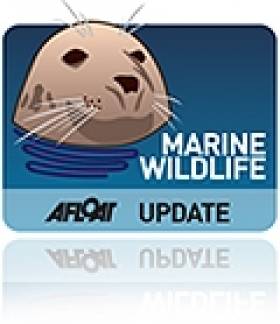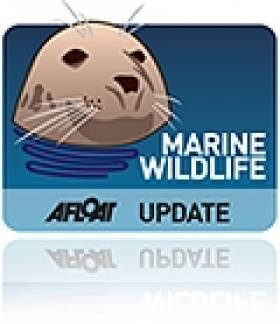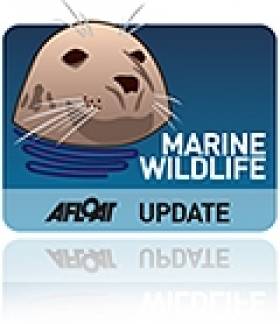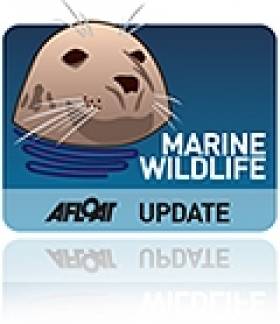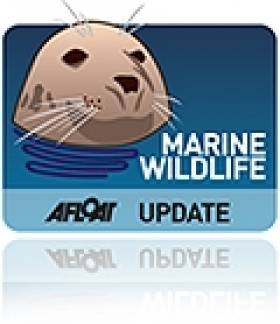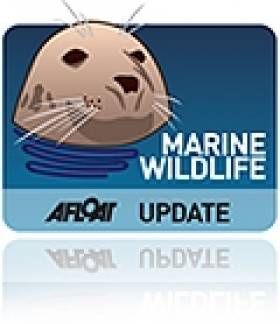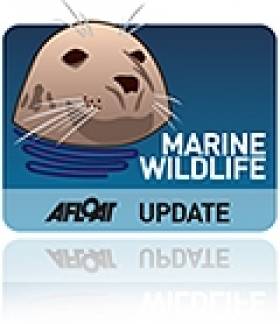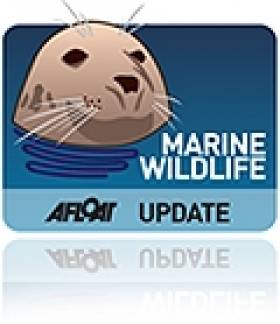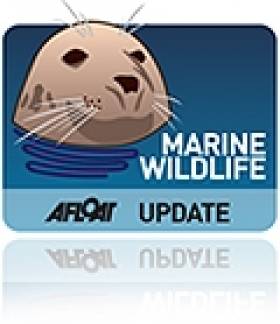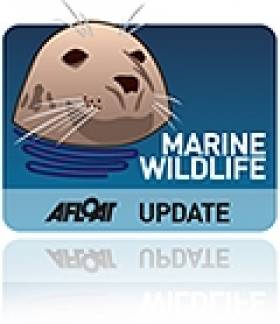Displaying items by tag: IWDG
Killer Whales, Minkes Spotted Off Coast
The Irish Whale and Dolphin Group (IWDG) has announced two new reports of whale spottings off the Irish coast in recent days.
On 14 October the east coast rescue helicopter spotted a group of at least five lunge-feeding whales just four miles off Dunany Point on the southern side of Dundalk Bay.
Their relatively small size, white banding on the pectoral fin and absense of any obvious blow confirmed them to be minkes - a marine wildlife record for the area.
"This is further proof, not that it is needed, that there is a growing list of places outside of the expected 'hotspots' where whale activity is now being documented," said the IWDG's Pádraig Whooley.
Yet more were spotted on the opposite coast the day after, when Nick Massett reported up to a dozen minke whales in a 1.5-mile box off Slea Head, near Dingle.
Meanwhile, this week a group of four killer whales was observed by the FV Celtic Cross on the prawn grounds off Co Louth, travelling in a north-westerly direction towards Dundalk Bay.
"There may well be something very interesting happening in this section of the Irish Sea that is attracting both baleen and toothed whale in the same area," said Whooley.
Bottlenose Dolphins Living On Ireland's East Coast
The Irish Whale and Dolphin Group (IWDG) has said that evidence suggests a pod of three bottlenose dolphins is living on the east coast of Ireland.
According to RTÉ News, the organisation as validated close to 200 sightings of the dolphins - one of whom was spotted off Co Down in October 2010 - along the Dublin and Wicklow coastline in the last year.
The IWDG's Pádraig Whooley says that further analysis of theor movements show that they rarely travel north beyond Dalkey Island or south of Wicklow town, indicating a core range of 21 miles (33km).
"Remarkably, they seem to split their time evenly between their Dublin and Wicklow hotspots, thus making them extremely easy to locate, observe and photograph," he adds.
"In fact... the best way to find them other than checking this site, is probably to jump on a DART train in Dun Laoghaire bound for Greystones (or visa versa), making sure to look out the correct window."
While well known for being "boisterous, interactive and gregarious", bottlenose dolphins are also "indescriminate killers of porpoises and other dolphin species, with well-documented cases of infanticide".
Neither are they to be taken lightly by swimmers, with "a case load in Ireland of attacks on swimmers leading to serious injury, and at least one overseas case of [a bottlenose] killing a swimmer.
"It's nice to be able to boast of an apex predator lurking so close to the capital," says Whooley.
RTÉ News has images of the dolphins in action off the south Dublin coastline HERE.
Places Available on IWDG Whale Watch Weekends
The Irish Whale and Dolphin Group (IWDG) is offering a limited number of places to non-members on its two upcoming autumn/winter whale-watching weekends in Co Cork.
The weekends, based at the Celtic Ross Hotel in Rosscarbery, are geared towards sightings of larger marine wildlife – specifically fin and humpback whales, which are commonly sighted in West Cork between October and December.
Two weekends are scheduled, on 28-30 Octover and 25-27 November, and both will include presentations as well as plenty of whale-watching opportunities on land and at sea.
The IWDG has also negotiated a special weekend rate of €120 at the Celtic Ross Hotel which includes two nights' B&B, an evening meal and a packed lunch.
The weekends are being booked in succession, both limited to 12 bookings, with seven places currently remaining for the first weekend. The IWDG warns that the trips are not suited to anyone in poor health or prone to sea-sickness, and that as always whale spottings cannot be guaranteed.
Anyone interested in attending or wishing to enquire further can contact Pádraig Whooley at [email protected] or 023 8838761, or write to the IWDG, Dereen, Rossmore, Clonakilty, Co Cork.
IWDG 21st Anniversary Banquet in November
The Irish Whale and Dolphin Group (IWDG) will celebrate its 21st anniversary at a special banquet on Saturday 19 November at the Grand Hotel in Malahide, Co Dublin.
The evening will consist of a three-course meal and entertainment including music and dancing, a film show of IWDG activities over the years, an international guest speaker (to be announced) exploring the impact of the IWDG on cetacean recording.
The marine wildlife conservation group's AGM will take place earlier in the day at the Grand Hotel at 2pm.
Tickets for the banquet are €60 - book early as places are limited to 120. To book contact Shay Fennelly at [email protected] or 087 642 8902.
Overnight accommodation is also available at the Grand Hotel with special rates for banquet guests of €90 for a single room and €110 for a double/twin room. To book contact Hilary Fogarty, quoting IWDG as the reference, at 01 845 0000, 01 816 8281 or [email protected].
Time Running Out for Scotland's Resident Killer Whales
Time may be running out for Scotland's only resident pod of killer whales, the Scotsman reports.
The four males and five females have been studied at their home in the west of Scotland by the Hebridean Whale and Dolphin Trust and the Irish Whale and Dolphin Group for almost 20 years.
The marine mammals have been sighted at various times since 1981 by members of the public in Scotland, Wales and Ireland.
But since 1992 the group - known as the West Coast Community - has failed to produce a single surviving calf.
Marine biologist Dr Andy Foote said: "It's probably too late to save this group. I do believe that they will become extinct in our lifetime which is very regrettable since not many people even know that such a distinctive group of killer whales exist just off our coast."
Dr Foote believes possible contaminants in the waters off Scotland's west coast could be one reason why the pod is not successfully breeding.
The Scotsman has more on the story HERE.
Celtic Mist Will Track Elusive Blue Whale
The infamous Celtic Mist is set to be used to track one of the most elusive marine animals in Irish waters.
The Irish Examiner reports that one of the first duties of the yacht under its new ownership by the Irish Whale and Dolphin Group (IWDG) will be to track down the blue whale, the last of which was spotted off the Irish coast in 2009.
"We’ve made two sightings of the blue whale on the shelf edge but with the Celtic Mist we will be able to go out there for a few weeks and sit there and wait for them," said the IWDG's Dr Simon Berrow.
"Hopefully we will find some more when we bring the Celtic Mist out there. They are very rare."
The blue whale is regarded as the largest animal to have ever lived on earth. They also have an average lifespan of well over 100 years.
As previously reported by Afloat.ie, Celtic Mist was gifted by the Haughey family to the IWDG earlier this year to assist in its marine conservation work.
The yacht competed in a leg of the 2011 Tall Ships Race from Waterford to Scotland before moving to its new home in Co Clare, where it will be refitted for its new life as a research vessel.
Sperm Whale Dies on Dungarvan Beach
A sperm whale that beached on a sand spit in Dungarvan, Co Waterford on Friday has died.
The male whale had been spotted off the coast in the 24 hours before it was discovered 'live stranded' on Cunnigar Strand.
Rescuers said there was "no effective way" of refloating the 10+ metre long whale from what became its final resting place.
"Once they come this far inshore they are pretty much doomed," the Irish Whale and Dolphin Group's (IWDG) Pádraig Whooley told the Irish Examiner.
No decision has yet been made regarding disposal of the whale carcass, but Irish Weather Online quotes Whooley as saying it is "a wasted opportunity when these magnificent specimens are simply hauled off for incineration".
Fin Whales Come Closer to Kerry Coast
Though they failed to track down the elusive humpback whales, IWDG members were recently treated to their first sighting of fin whales in Co Kerry's inshore waters.
With permission from the Haughey family to land on Inis Mhic Aoibhleáin - the most westerly point in Europe - as a vantage point, 20 members of the Irish Whale and Dolphin Group set out south towards the Scelligs following tell-tale blows.
Amid hundreds of dolphins and as many as 11 minke whales seen throughout the day, the first fin whale was found 10 miles south of the Blaskets.
Two more were spotted 4 miles northwest of Sceilig Mhichíl, both of which were biopsied.
"What we observed was spectacular activity in an area which appeared to be devoid of life just the week before," said the IWDG's Conor Ryan.
The IWDG has more on the story, including photos, HERE.
Bottlenose Dolphins Make New Home in Donegal
The Irish Independent reports that some 100 bottlenose dolphins have made a new home off the Donegal coast in the past week.
The pod of bottlenoses - a rare treat in Irish waters compared to the near ubiquitous common dolphin - has been spoted by boaters and wildlife enthusiasts in the inner Donegal Bay, between Rossnowlagh Beach and Doorin Head.
Patrick Lane of the Irish Whale and Dolphin Group said the bottlenose often swims closer to the shore than its more common counterparts, making it much easier for people on shore to catch a glimpse.
The Irish Independent has more on the story, including photos, HERE.
All-Ireland Whale Watch Day Next Weekend
All are invited to take part in the All-Ireland Whale Watch Day next Sunday 21 August.
The Irish Whale and Dolphin Group (IWDG) is organising 13 land-based whale watches from headlands around the Irish coast on the day from 2pm-5pm as part of the Heritage Council's annual Heritage Week.
Each will be led by experienced IWDG personnel, who will show you how to observe and identify some of the more commonly observed large marine wildlife seen in Irish waters.
The watches are free to attend - all that is required is to bring binoculars or a spotting scope, and dress appropriately for outdoor conditions.
The purpose of day is to raise awareness of the 24 species of cetaceans (porpoises, dolphins and whales) that can be seen around the Irish coast. The event will also provide IWDG researchers with a unique snapshot of whale and dolphin activity in Irish waters.
For details on your nearest whale watch visit the IWDG Whale Watch Ireland website.



























